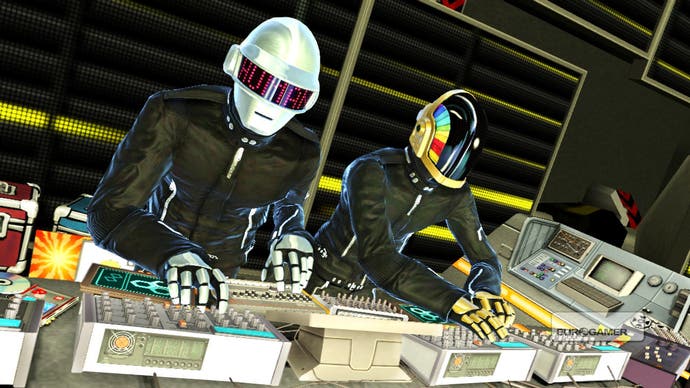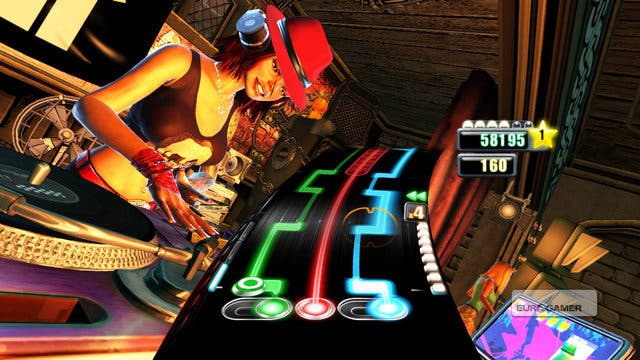DJ Hero
Floor filler?
The turnaround has been astonishing. Guitar Hero launched in 2005, its first set-list composed extensively of cover versions, with the music industry's nostrils too busy sweeping lustily over cisterns to pay it much heed. Developer Harmonix was virtually required to shuffle up to record label doors, cap in hand, begging for whatever scraps of licensed music were lying around.
$2 billion and 25 million sales later, someone else is now wearing the trousers in this increasingly noisy relationship, and so DJ Hero arrives this week with an emperor's fanfare and a marketing budget beyond the wildest fantasies of the original Guitar Hero team. Indeed, as I type this, fizzing flutes are clinking at the DJ Hero London launch bash where, the game's official Twitter feed hics, "DJ Shadow two hour set rocked the house!" Not this one, buddy.
But the point is that DJ Shadow features heavily in the game, both as content and semi-shrouded avatar. And he's hardly alone. Jay-Z, Eminem, Daft Punk, Grandmaster Flash, Scratch Perverts, Z-Trip and DJ Yoda are just some of the Who's Who of stars actively involved in the project, from inception through to release.
Somewhere beneath this megabucks power-mongering is FreeStyleGames, and a tale of two studios: one in glamorous Leamington Spa, handling the game development; the other in trendier east London, devoted exclusively to mix-creation. It's this that starts to mark DJ Hero out as something different from other music games.
The 93 mixes on the game disc, blended from a pool of some 100 tracks, have been created exclusively and specifically for the title. At best, a Guitar Hero or Rock Band product is a game and a greatest hits compilation. DJ Hero's vital, varied, surprising and vast musical content is as fresh to a music gamer's ears as the gameplay is to their fingers.

It's brilliant. Different strokes for different folks and all that, but it's hard to imagine any interested gamer not finding something to inspire them here, whether it's the cocksure Euro-sleaze of Queen crowned by Daft Punk, the prankish eargasm of Vanilla Ice melted into MC Hammer, or the synapse-frying relentlessness of Scratch Perverts' Noisia.
The music is divided into 24 distinct sets, some artist-specific - "Jay-Z Mixtape", "DJ Shadow presents", and so on - others compiled thematically by FreeStyle. This provides a compelling structure that accentuates the game's unexpected diversity, with some sets leaning heavily on frenzied scratching, while others fly more familiar button combos down the vinyl track at the player.
Let's talk turntable. While DJ Hero's peripheral carries the unmistakable, Fisher Price 'my first instrument' look pioneered by Guitar Hero, it feels pleasingly sturdy and, in the main, performs its tasks admirably - with one notable exception, which I'll come to.

First, to recap how it all works: to simulate real-world dual turntables without requiring the player always to look down at the controller, blue and green buttons on the single platter represent left and right. The platter rotates freely in both directions through 360 degrees, though the only time you're required to give it a full spin is when activating 'Rewind' - a skill reward allowing you partially to roll back and replay to boost your score. Otherwise, short, sharp scratching is in order to match the on-screen patterns.
Mixes are performed by button-matching and scratching in time, switching left and right with the crossfader, then layering samples - either scripted, via the platter's central red button, or freeform via the 'euphoria' button at relevant points - and bending audio in real-time by twiddling an effects knob.
I've no doubt there will be many self-regarding 'real' DJs queuing up to call out Hero's inaccuracies and inconsistencies as a DJ experience. I can't comment directly since I don't DJ; what I can say, as a Guitar Hero-worshipping guitar player, is that I see such opinions as I do those of the binary-minded bores who scorn Guitar Hero because you can't suddenly break out into a minor mixolydian flourish mid-song. To do so is to miss the point spectacularly; the failure is one of imagination. What should be focused on ought to be obvious: how engaging it is as a game, and whether the simulated experience is actually fun.


